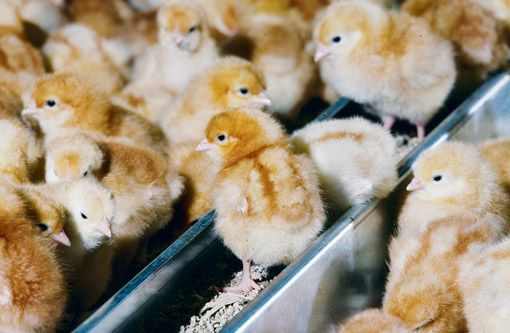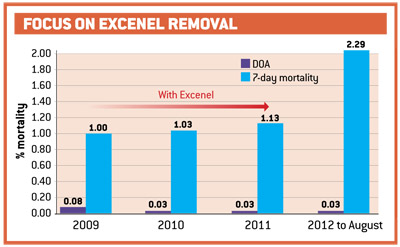Mortality increase without antibiotics

Antibiotic immunity was a hot topic at this year’s Poultry Meat Conference at Stoneleigh, as Jake Davies found out
Chick losses in the first seven days have increased noticeably since the British Poultry Council introduced a voluntary ban, in January, on the use of the antibiotic Excenel in day-old chicks.
But, according to Graeme Dear, general manager at Aviagen, there is a great deal everyone in the supply chain can do to improve things.
At the beginning of January, Dr Dear had made several predictions about how things would develop: dead-on-arrivals would be the same, but seven-day losses would be higher, as would flock variability.
These predictions have proved to be accurate.
Figures presented by Dr Dear showed that, from January to August, birds dead-on-arrival hadn’t changed compared with the previous three years, at just 0.03%. “Basically chick quality remains exactly what it was,” he said.
But seven-day mortality in the same period came to 2.29%, compared with about 1.1% from 2009-11.
Dr Dear called the use of Excenel “a crutch, for breeders, hatchery, transportation and producers”. Everyone was going to have to “do their bit” to get along without it.
Breeders would have to improve cleanliness, use nest mats and control litter quality better, he said. And the hatcheries would have to improve their procedures. “Everything we do to the chick – and we’re asked to do more and more – applies stress, and that breaks down its ability to activate its immune system.”
Speed was of the essence in the transport phase, to get birds on to farms quickly, while farmers needed to optimise brooding conditions and maximise biosecurity.
Everyone in the supply chain had to communicate, to keep things running smoothly. “There are no second chances – you haven’t got the safeguard that Excenel provides.”
But Dr Dear was optimistic that things would settle down without Excenel, with seven-day mortality of 1.5-2% becoming the “new norm”.
Swedish figures from 1998-2012 supported this prediction. “In the first few years (without antibiotics) there was a lot of flock-to-flock variability, but things improved,” he said.

